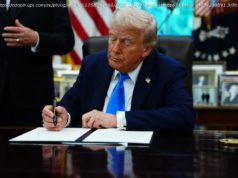Civil Human Rights Front, which organises annual demonstration, expects about 60,000 people to turn up for event marking 21st anniversary of city’s return to Chinese rule
Roads were closed on Sunday around Hong Kong’s Victoria Park as demonstrators started to stream into Causeway Bay for the annual July 1 pro-democracy march, set to start from the park at 3pm in uncomfortable proximity to an outdoor celebration organised by a pro-China group to mark the 21st anniversary of the city’s handover from British to Chinese rule.
Organised by the Civil Human Rights Front – an umbrella group of some 50 pro-democracy groups – the march is both a protest against Chinese power and a show of support for democracy. This year, the theme is “End one-party dictatorship, reject the fall of Hong Kong”.
The starting point of the march has been a matter of contention this year. Police ordered the march to begin on the central lawn of the park. But the front, which had planned to start the march from East Point Road, opposed that plan, saying participants could clash with the pro-Beijing group using the six soccer pitches at the same time.
The front appealed but lost. It remained defiant and insisted that some of its core member groups would start the march from elsewhere and join the procession midway, although it would officially begin the march from the central lawn, following police orders.
Police warned that anyone ignoring force orders could be arrested for unlawful assembly.
The front said it expected turnout to be more or less the same as last year’s 60,000. Police estimated the turnout was 14,000 last year, a 14-year low.
3.15pm — Protesters following orders, so far
Dozens of police officers were seen patrolling East Point Road and Great George Street, near where they specifically told protesters not to assemble. No protesters were seen gathering there, after the rally organiser told the public not to, for fear of clashes.
Multiple groups set up booths on Great George Street to seek donations from the public, including People Power, Demosisto, and the League of Social Democrats. Ousted lawmaker Lau Siu-lai – «actively considering» running in the Legislative Council by-election for the Kowloon West seat in November – was also seen seeking donations.
«We don’t fear Ko Wing-man,» Lau said, referring to speculation that the former health minister could run in Kowloon West for the pro-establishment camp.
The march has officially begun, with about 400 people setting off from the park’s central lawn, the police-sanctioned starting point.
3.00pm — ‘Society has made our teenagers think it’s not important; obey the Chinese government’
Taylor Lam, an 18-year-old who just completed the DSE exam, was at the march on his own. He was dismayed by what he saw as political apathy and an influx of mainland Chinese migrants.
“[My classmates] don’t have much interest in politics,” he said. “I think society has made our teenagers think it’s not important; obey the Chinese government. They only focus on studies, find a good job and income.
“First people don’t care about it, then our rights will easily be taken by the Chinese government. We’ll have no bargaining power on any policies. There are lots of new immigrants from China who apply for public housing. Even our locals don’t have enough space to live.”
2.45pm — Carrie Lam’s ‘political line has not moved an inch’
Legislator Au Nok-hin, vice-convenor of the front, called on the public to join the march to call for an “end of one-party dictatorship” and uphold “one country, two systems”, the governing formula under which Beijing has ruled the city since 1997.
“[Chief Executive] Carrie Lam Cheng Yuet-ngor claimed the social atmosphere has turned better,” he said. “But there are still many social conflicts that remain unsolved. Lam’s political line has not moved an inch.”
By way of example, he cited the – rushed, as he saw it – passage of the controversial co-location bill that allowed mainland law to be enforced in the city for the first time.






